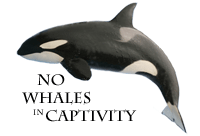Cruelty of captivity
industry exposed

|
|
||
|
WDCS, the Whale and Dolphin Conservation Society, is today (April
2006) uncovering the worrying involvement of the aquarium
industry in dolphin hunts in Japan. |
||
 |
With increasing numbers of people visiting dolphins held in
aquaria, the demand for these animals has never been greater.
Today, WDCS, the Whale and Dolphin Conservation Society, reveals
that one of the world’s largest sources of wild dolphins for
display in aquaria, and certainly the cruelest, is dolphin drive
hunts in Japan. |
|
|
|
||
 |
Confined in the shallows, the young and pretty members of the pod
are picked out by aquarium staff and hauled away to a lifetime of
confinement – a life that is likely to be significantly shortened
by the stress of the capture and the effects of captivity. |
|
|
|
||
 |
Although Japan has been conducting drive hunts for many years,
evidence suggests that this cruel practice was coming to an end.
With little demand for dolphin meat, and an increase in the
popularity of whale and dolphin watching, drive hunts were
becoming a thing of the past. However, with the high prices
offered by aquaria in Japan and some other countries for the live
dolphins captured in these hunts, it is this demand that has now
become the primary motivation for the hunts to continue. |
|
|
|
||
 |
Anti-Captivity Campaigner for WDCS, Cathy Williamson, says: “We
believe that people would not visit aquariums holding animals
captured in drive hunts if they knew the truth about the cruel way
in which the whales and dolphins came to be there. These animals
are highly intelligent, self-aware beings. During the hunts they
suffer extreme fear and distress, not to mention the pain of
slaughter, over a prolonged period of time. Added to this is the
stress of confinement in captivity, torn from their families and
the life of freedom they enjoyed in the wild. If you want to help
us to end the drive hunts in Japan, please log on to
www.drivenbydemand.org to find out more.” |
|
|
|
||
Will you help the whales today?
YES
© Coalition For No Whales In Captivity 2006


